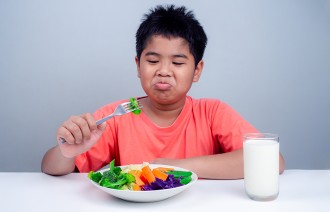Turning Picky Into Adventurous Eaters: What Not to Say and Do
Turning Picky Into Adventurous Eaters: What Not to Say and Do
May 13, 2025By Tanni Haas, Ph.D.

May 4 is National Fitness Day, a great opportunity to consider what parents can do to turn their kids from picky into adventurous eaters. Picky eaters are common. Most kids go through a picky eating phase from age 2 – 4, and many continue to be picky eaters well into their teens. That doesn’t make it any less stressful for parents. It’s hard to come up with balanced, healthy meals for kids who refuse to eat more than a few foods. Luckily, there’s much you can say and do to broaden your kids’ palates. But turning picky into adventurous eaters is as much about what you don’t say and do. Here’s what the experts suggest:
Don’t demand or threaten your kids to eat
If you want your kids to eat a variety of foods, one of the worst things you can do is to force it on them. “Demanding or threatening your child can be frustrating and lead to arguments,” says clinical child psychologist Dr. Britt Evans, “which can lead to negative associations with certain foods.” One large-scale study found that kids who were pressured to eat certain foods as toddlers were significantly picker eaters by the time they reached school-age. Other studies show that pressuring kids to eat certain foods leads to less consumption of fruits and vegetables, and that negative attitudes towards food last into adulthood.
Instead, says Rachel Ehmke of the Child Mind Institute, “try to respect your child’s preferences while gently encouraging them to try new foods.” Pediatric occupational therapist Alisha Grogan, agrees. She suggests that parents simply put the desired foods in front of their kids and then allow them to decide whether and how much they’d like to eat. “If you think about it,” Ms. Grogan says, “they’re really in control of this anyway - and they know it!”
Don’t use food as a reward
A common refrain heard across dinner tables is: “If you eat your vegetables, you’ll get dessert.” Intuitively, it may seem logical to use foods that your kids want, like dessert, as a reward for getting them to eat what you really want them to eat: vegetables. But this strategy is likely to backfire. “Asking your child to eat non-preferred foods like vegetables to gain access to a ‘reward’ food like dessert might work in the short term,” Dr. Evans says, “but is counterproductive in the long term because it can enforce the idea that certain foods (e.g., sweets) are inherently ‘better’ than others (e.g., veggies).” Amy McCready, the founder of Positive Parenting Solutions, a major parenting site, puts is even more pointedly: “why should they get to eat something bad for doing something good?” Simply put, your kids will learn to think of dessert and other sweet foods as inherently more enjoyable than healthier foods like fruits and vegetables. Instead, try to make your kids think of healthy foods as enjoyable in their own right.
Don’t ban sweets
This doesn’t mean that you should ban sweets or other “bad” foods altogether. Banning sweets only make them more exciting which can lead to overindulging and abuse. Instead, says Dr. Dina Rose, a sociologist and author of It’s Not About The Broccoli, discuss with your kids how often and how much candy they can eat.
Don’t label your kids
Your kids may be picky eaters but don’t call them that to their face or behind their backs to others. “If you have a picky eater and you’ve made that clear with phrases like, ‘Oh, she doesn’t eat that,’ or ‘He’s so picky – he’ll only eat mac and cheese, guess what?” Ms. McCready asks. “Your child will ‘not eat that’ and ‘only eat mac and cheese.’” You’re effectively encouraging your kids to conform to the very behavior that you’re criticizing. As Ms. McCready puts it, “children own the labels you bestow upon them.”
Using positive labels can also be problematic. “Think about it,” says Ms. McCready. “When you label one child the ‘good eater,’ his sibling can only assume he’s the ‘bad eater’ setting up an environment for sibling rivalry to thrive. The bottom line is this: avoid labels, positive or negative.”
Don’t make a separate meal
Your kids may not like what’s for dinner but that doesn’t mean that you should make a separate meal just for them. “This isn’t Mom’s 24-Hour Diner,” as clinical child psychologist Dr. Rachel Busman puts it. Instead, says Sally Sampson, author of The Picky Eater Project, offer some “boring” alternatives that make them more likely to at least try what’s for dinner.
Don’t patronize them
When your kids finally decide to try a new food, resist the urge to say, “I told you that you’d like it,” or some variation thereof. “Well-meaning parents believe they’re being supportive and don’t realize that it’s patronizing and not a helpful comment,” says Amy Morin, a licensed clinical social worker with expertise in kids and nutrition. Instead, she suggests, “let the child make the decision to taste it at their own pace and pause, letting them tell you how they felt about it. If they don’t like the taste, you can praise them for trying it by saying ‘Wow, you’re very brave! It’s not easy to try new things, but you did it!’”
Try, try – and try again
It isn’t easy to turn to a picky eater into an adventurous one but it can be done if you’re careful about what you say – and don’t say. As Ms. Morin puts it, “Raising an adventurous eater means raising a child who feels confident in and is given space to make decisions about what goes into their body.”
Bio:
Tanni Haas, Ph.D. is a Professor in the Department of Communication Arts, Sciences, and Disorders at the City University of New York – Brooklyn College.




